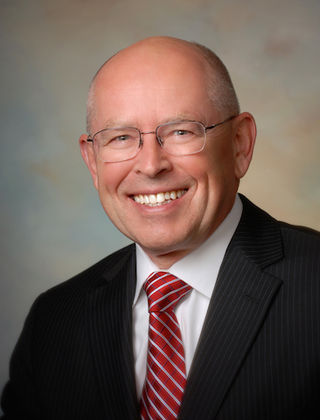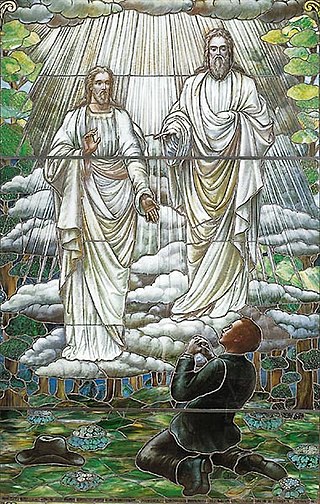Related Research Articles

Reformed Christianity, also called Calvinism, is a major branch of Protestantism that began during the sixteenth-century Protestant Reformation, a schism in the Western Church. In the modern day, it is largely represented by the Continental Reformed, Presbyterian, and Congregational traditions, as well as parts of the Anglican and Baptist traditions.

Original sin in Christian theology refers to the condition of sinfulness that all humans share, which is inherited from Adam and Eve due to the Fall, involving the loss of original righteousness and the distortion of the Image of God. The biblical basis for the belief is generally found in Genesis 3, and in texts such as Psalm 51:5 and Romans 5:12–21.
This is an index page of Wikipedia articles related to the topic of religion.
Oneness Pentecostalism is a nontrinitarian religious movement within the Protestant Christian family of churches known as Pentecostalism. It derives its name from its teaching on the Godhead, a form of Modalistic Monarchianism commonly referred to as the Oneness doctrine. The doctrine states that there is one God―a singular divine spirit with no distinction of persons―who manifests himself in many ways, including as Father, Son, and Holy Spirit. This stands in sharp contrast to the mainstream doctrine of three distinct, eternal persons posited by Trinitarian theology.
The following outline is provided as an overview of and topical guide to Christian theology:

Anabaptist theology, also known as Anabaptist doctrine, is a theological tradition reflecting the doctrine of the Anabaptist Churches. The major branches of Anabaptist Christianity agree on core doctrines but have nuances in practice. While the adherence to doctrine is important in Anabaptist Christianity, living righteously is stressed to a greater degree.

Wayne A. Grudem is an American New Testament scholar, theologian, seminary professor, and author. He is a professor of theology and biblical studies at Phoenix Seminary in Phoenix, Arizona.

Christians for Biblical Equality (CBE) is an organization that promotes Christian egalitarianism and is headquartered in Minneapolis, Minnesota. CBE's Mission Statement reads: "CBE exists to promote biblical justice and community by educating Christians that the Bible calls women and men to share authority equally in service and leadership in the home, church, and world." According to its website, CBE "is a nonprofit organization of Christian men and women who believe that the Bible, properly interpreted, teaches the fundamental equality of men and women of all ethnic groups, all economic classes, and all age groups, based on the teachings of Scriptures such as Galatians 3:28: 'There is neither Jew nor Gentile, neither slave nor free, nor is there male and female, for you are all one in Christ Jesus' ."

The Council on Biblical Manhood and Womanhood (CBMW) is an evangelical Christian organization promoting a complementarian view of gender issues. According to its website, the "mission of The Council on Biblical Manhood and Womanhood is to set forth the teachings of the Bible about the complementary differences between men and women, created equally in the image of God, because these teachings are essential for obedience to Scripture and for the health of the family and the church." CBMW's current president is Dr. Denny Burk, a professor of biblical studies at Boyce College and director for The Center for Gospel and Culture at The Southern Baptist Theological Seminary. Its 2017 "Nashville Statement" was criticized by egalitarian Christians and LGBT campaigners, as well as by several conservative religious figures.

Complementarianism is a theological view in some denominations of Christianity, Rabbinic Judaism, and Islam, that men and women have different but complementary roles and responsibilities in marriage, family, and religious life. Complementary and its cognates are currently used to denote this view. Some Christians interpret the Bible as prescribing a complementary view of gender, and therefore adhere to gender-specific roles that preclude women from specific functions of ministry within the community. Though women may be precluded from certain roles and ministries, they still hold foundational equality in value and dignity. The phrase used to describe this is "ontologically equal, functionally different."
The theology of the Seventh-day Adventist Church resembles early Protestant Christianity, combining elements from Lutheran, Wesleyan-Arminian, and Anabaptist branches of Protestantism. Adventists believe in the infallibility of the Scripture's teaching regarding salvation, which comes from grace through faith in Jesus Christ. The 28 fundamental beliefs constitute the church's current doctrinal positions, but they are revisable under the guidance of the Holy Spirit, and are not a creed.

Christian egalitarianism, also known as biblical equality, is egalitarianism based in Christianity. Christian egalitarians believe that the Bible advocates for gender equality and equal responsibilities for the family unit and the ability for women to exercise spiritual authority as clergy. In contrast to Christian complementarianists and Christian patriarchists, proponents of Christian egalitarianism argue that Bible verses often used to justify patriarchal domination in gender roles are misinterpreted. Egalitarians believe in a form of mutual submission in which all people submit to each other in relationships and institutions as a code of conduct without a need for hierarchical authority.

The theology of Ulrich Zwingli was based on an interpretation of the Bible, taking scripture as the inspired word of God and placing its authority higher than what he saw as human sources such as the ecumenical councils and the church fathers. He also recognised the human element within the inspiration, noting the differences in the canonical gospels. Zwinglianism is the Reformed confession based on the Second Helvetic Confession promulgated by Zwingli's successor Heinrich Bullinger in the 1560s.

In Christianity, sin is an immoral act and transgression of divine law. The doctrine of sin is central to the Christian faith, since its basic message is about redemption in Christ.

Mormonism and Nicene Christianity have a complex theological, historical, and sociological relationship. Mormons express their doctrines using biblical terminology. They have similar views about the nature of Jesus Christ's atonement, bodily resurrection, and Second Coming as mainstream Christians. Nevertheless, most Mormons do not accept the doctrine of the Trinity as codified in the Nicene Creed of 325 and the Nicene-Constantinopolitan Creed of 381. Although Mormons consider the Protestant Bible to be holy scripture, they do not believe in biblical inerrancy. They have also adopted additional scriptures that they believe to have been divinely revealed to Joseph Smith, including the Book of Mormon, the Doctrine and Covenants, and the Pearl of Great Price. Mormons practice baptism and celebrate the sacrament of the Lord's Supper, but they also participate in other religious rituals. Mormons self-identify as Christians.
Christian theology is the theology – the systematic study of the divine and religion – of Christian belief and practice. It concentrates primarily upon the texts of the Old Testament and of the New Testament, as well as on Christian tradition. Christian theologians use biblical exegesis, rational analysis and argument. Theologians may undertake the study of Christian theology for a variety of reasons, such as in order to:

In Reformed theology, baptism is a sacrament signifying the baptized person's union with Christ, or becoming part of Christ and being treated as if they had done everything Christ had. Sacraments, along with preaching of God's word, are means of grace through which God offers Christ to people. Sacraments are believed to have their effect through the Holy Spirit, but these effects are only believed to accrue to those who have faith in Christ.
Thomas R. Schreiner is an American Particular Baptist New Testament and Pauline scholar. He is the James Buchanan Harrison Professor of New Testament Interpretation at the Southern Baptist Theological Seminary. He previously taught at Bethel University and Azusa Pacific University. He is also co-chairman of the Christian Standard Bible's Translation Oversight Committee and is the New Testament editor of the ESV Study Bible. Schreiner has degrees from Western Oregon University, Western Seminary, and Fuller Theological Seminary.
Augustinian soteriology, influenced by Augustine of Hippo early engagements with Stoicism, Neoplatonism, and Manichaeism, played a crucial role in shaping Christian theology. Initially opposing deterministic views, Augustine later integrated aspects of these philosophies, especially during his disputes with the Pelagians. His doctrines, such as predestination by predeterminism, laid the groundwork for later theological developments. Augustine's influence on John Calvin was particularly significant in shaping Calvinist soteriology and understanding of divine providence.
Owen Strachan is an American Calvinist theologian. He is provost of Grace Bible Theological Seminary in Arkansas and became the Senior Director of the Dobson Culture Center in June 2024.
References
- ↑ Mack, Michael C (September 17, 2022). "Jack Cottrell and God's Plan A+". Christian Standard. Retrieved September 17, 2022.
- ↑ "Jack Warren Cottrell Obituary - Visitation & Funeral Information". www.fitchdenney.com. Retrieved September 29, 2022.
- ↑ "Cincinnati Bible Seminary » Faculty". Ccuniversity.edu. Archived from the original on December 24, 2010. Retrieved December 8, 2010.
- ↑ "Wipf and Stock Publishers". Wipfandstock.com. Archived from the original on July 17, 2011. Retrieved December 8, 2010.
- 1 2 "What I Have Learned in 50 Years as a Theologian (Part 2)". Christian Standard. May 30, 2010. Retrieved December 8, 2010.
- ↑ "Jack Cottrell". Ccubookstore.com. Archived from the original on December 21, 2009. Retrieved December 8, 2010.
- ↑ "Jack Cottrell". copanews.org. May 27, 2009. Archived from the original on July 25, 2011. Retrieved December 8, 2010.
- ↑ "Jack Cottrell Books - List of books by Jack Cottrell". Allbookstores.com. Retrieved December 8, 2010.
- ↑ Dr. Jack Cottrell. "What the Bible Says about Grace: Set Free! | College Press Publishing". Collegepress.com. Archived from the original on June 5, 2010. Retrieved December 8, 2010.
- ↑ Daniel J. Dyke. "Sovereignty and Free Will - Jack Cottrell". Dabar.org. Retrieved December 8, 2010.
- ↑ Cottrell, Jack (September 2022). "Jack Cottrell Collection". The Christian Restoration Association. Retrieved September 19, 2022.
- ↑ Cottrell, Jack (2022). BAPTISM: Zwingli or The Bible. The Christian Restoration Association. ISBN 979-8784141514.
- ↑ "Related subjects: Books by Dr. Jack Cottrell". www.dardapublishing.com. Archived from the original on August 16, 2012.
- ↑ Cottrell, Jack (2005). Romans NIV Commentary. College Press Publishing Company. ISBN 978-0899002477.
- ↑ Cottrell, Jack (September 19, 2022). "The Christian Restoration Association".
- ↑ "The History of Baptism Part 1" (PDF). www.orcuttchristian.org. Archived from the original (PDF) on July 27, 2011.
- ↑ "Archived copy" (PDF). Archived from the original (PDF) on July 15, 2011. Retrieved March 18, 2010.
{{cite web}}: CS1 maint: archived copy as title (link) - ↑ "Zwinglian Immersionists". Thecra.org. August 22, 2004. Archived from the original on July 28, 2011. Retrieved December 8, 2010.
- ↑ "Calvinism and the Bible: A Bibliography". Christian Standard. February 25, 2007. Retrieved December 8, 2010.
- ↑ "Comments on Jack Cottrell's Classical Arminian View" (PDF). Willamette University . Retrieved March 18, 2010.
- ↑ "Enjoying God Ministries". Enjoying God Ministries. November 6, 2006. Archived from the original on March 16, 2010. Retrieved December 8, 2010.
- 1 2 "Modalism: An Heretical View of the Trinity | Jack Cottrell". jackcottrell.com. January 27, 2010. Retrieved April 13, 2016.
- ↑ "Depravity: Total, Partial, or None at All? | Jack Cottrell". Archived from the original on December 14, 2014. Retrieved December 13, 2014.
- ↑ "The Faith Once for All" (pp. 197-200)
- ↑ "Depravity: Total, Partial, or None at All? | Jack Cottrell". jackcottrell.com. October 2, 2009. Retrieved April 13, 2016.
- ↑ Cottrell, Jack (September 4, 2000). What the Bible Says About God the Redeemer. Wipf and Stock Publishers. ISBN 9781579105235.
- ↑ Grudem, Wayne A. (February 1, 2011). Making Sense of Who God Is: One of Seven Parts from Grudem's Systematic Theology. HarperCollins Christian Publishing. ISBN 9780310493785.
- ↑ https://docs.google.com/document/d/1hTLkr_7tJ5jarvZIqEL2YZEIeFO7r6UEKQ3USKafQko/edit?hl=en [ dead link ]
- ↑ How feminism invaded the church.
- ↑ Mission vision